2019.05.15 - Bass Magazine - Interview with Duff
Page 1 of 1
 2019.05.15 - Bass Magazine - Interview with Duff
2019.05.15 - Bass Magazine - Interview with Duff




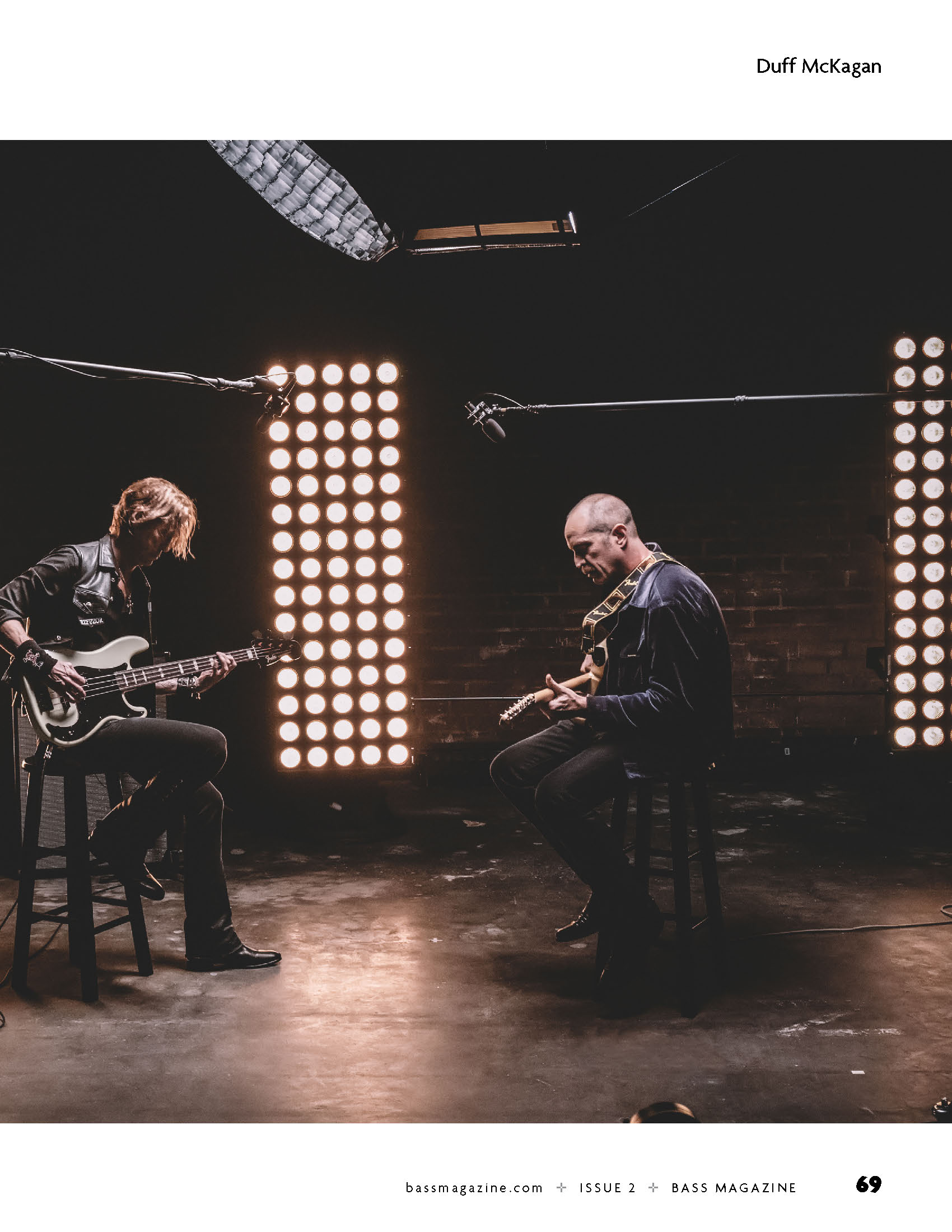

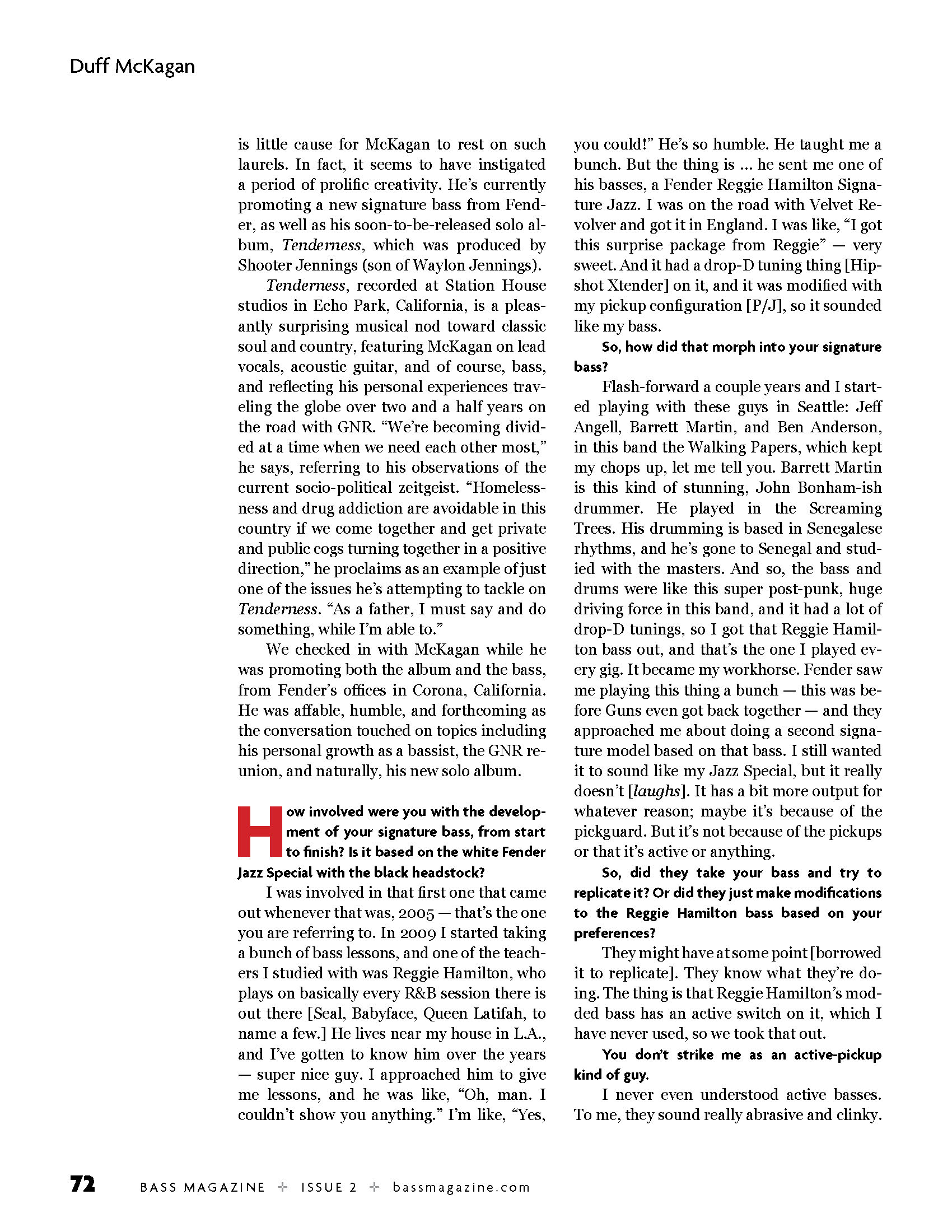
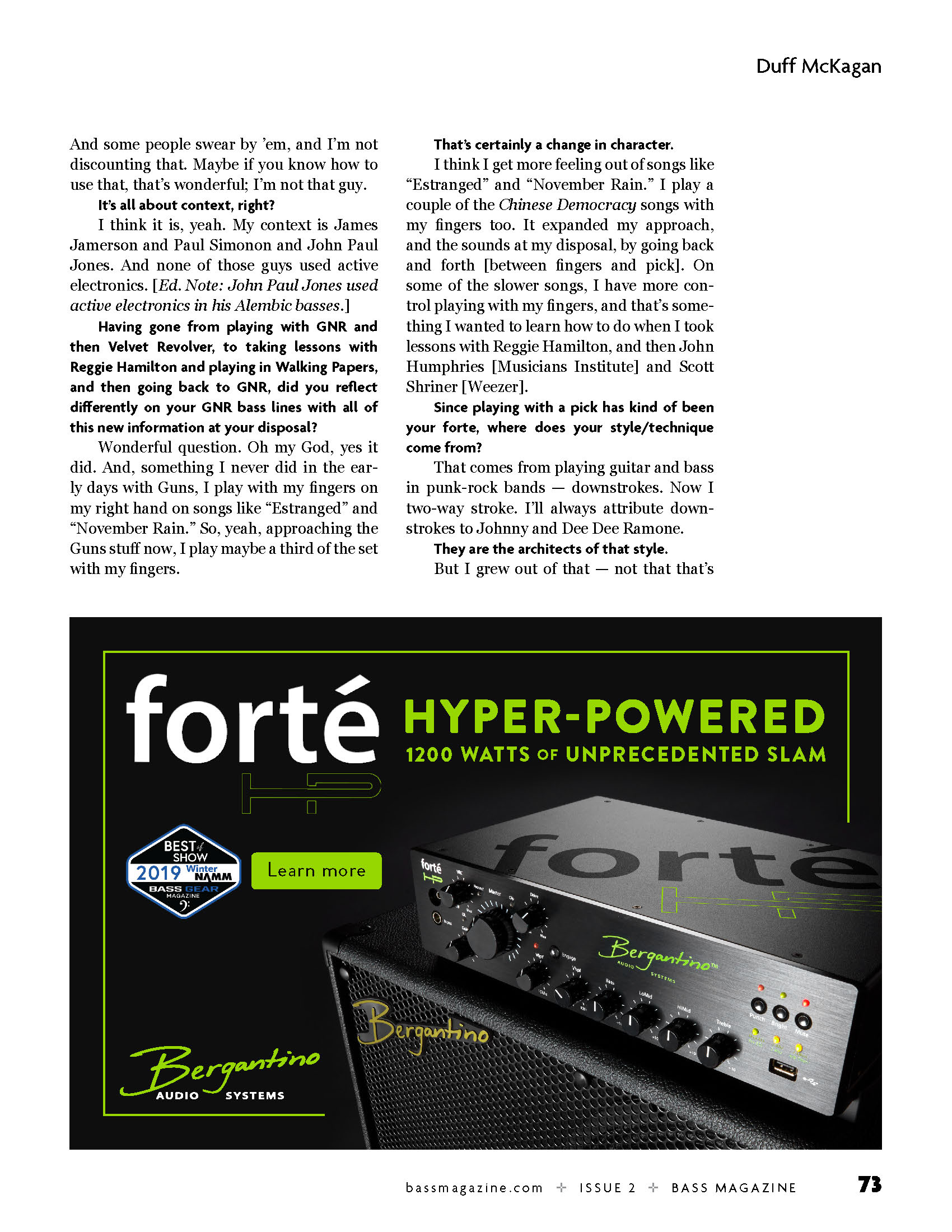

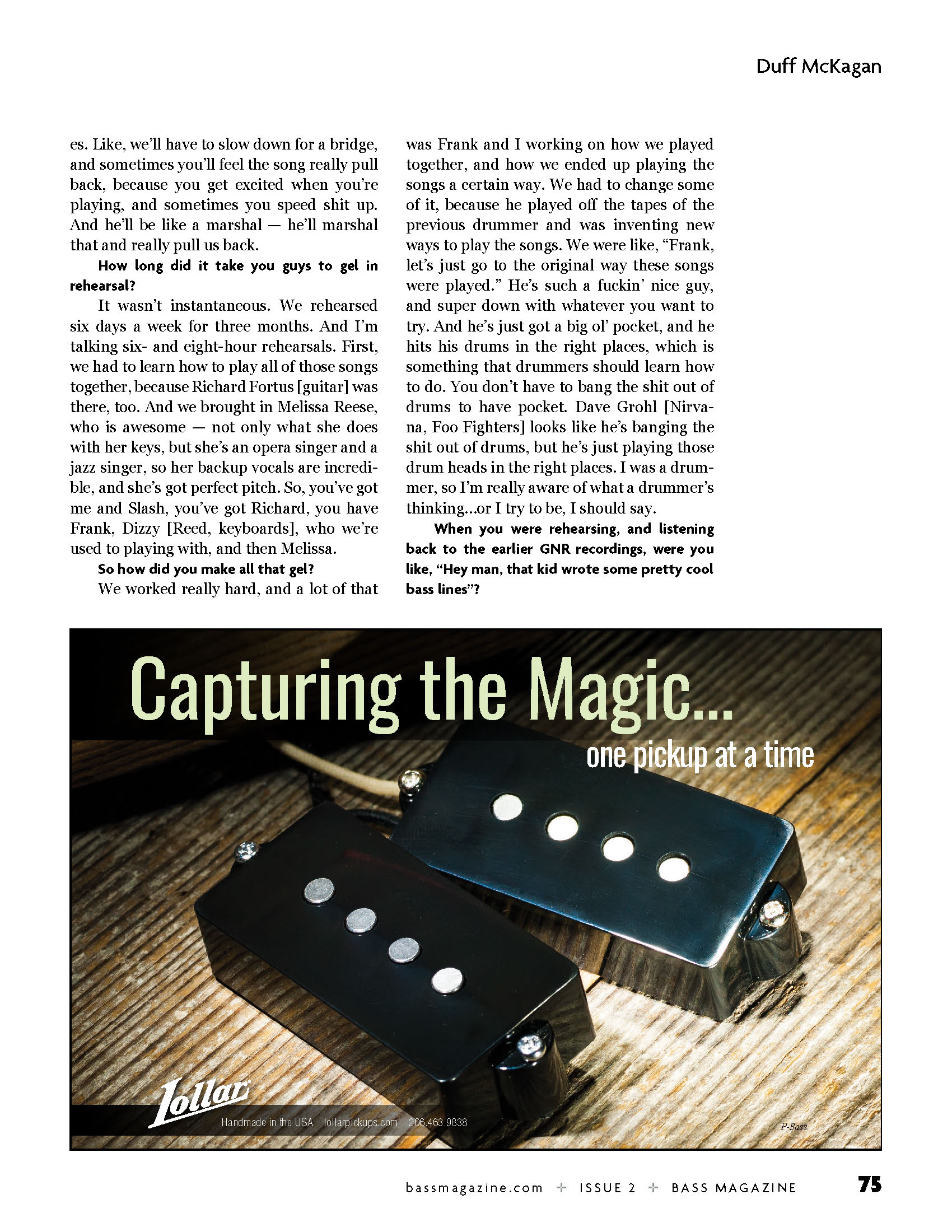
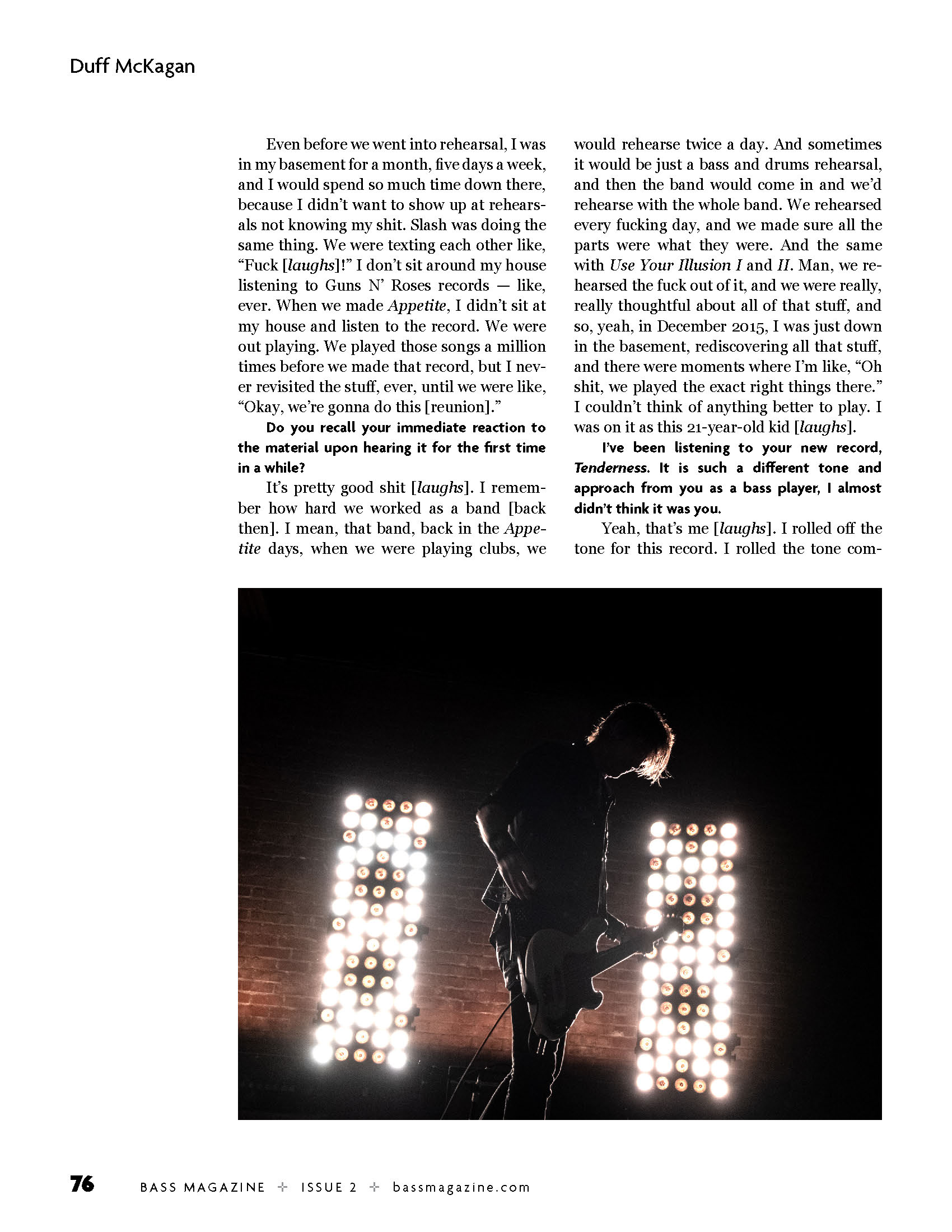
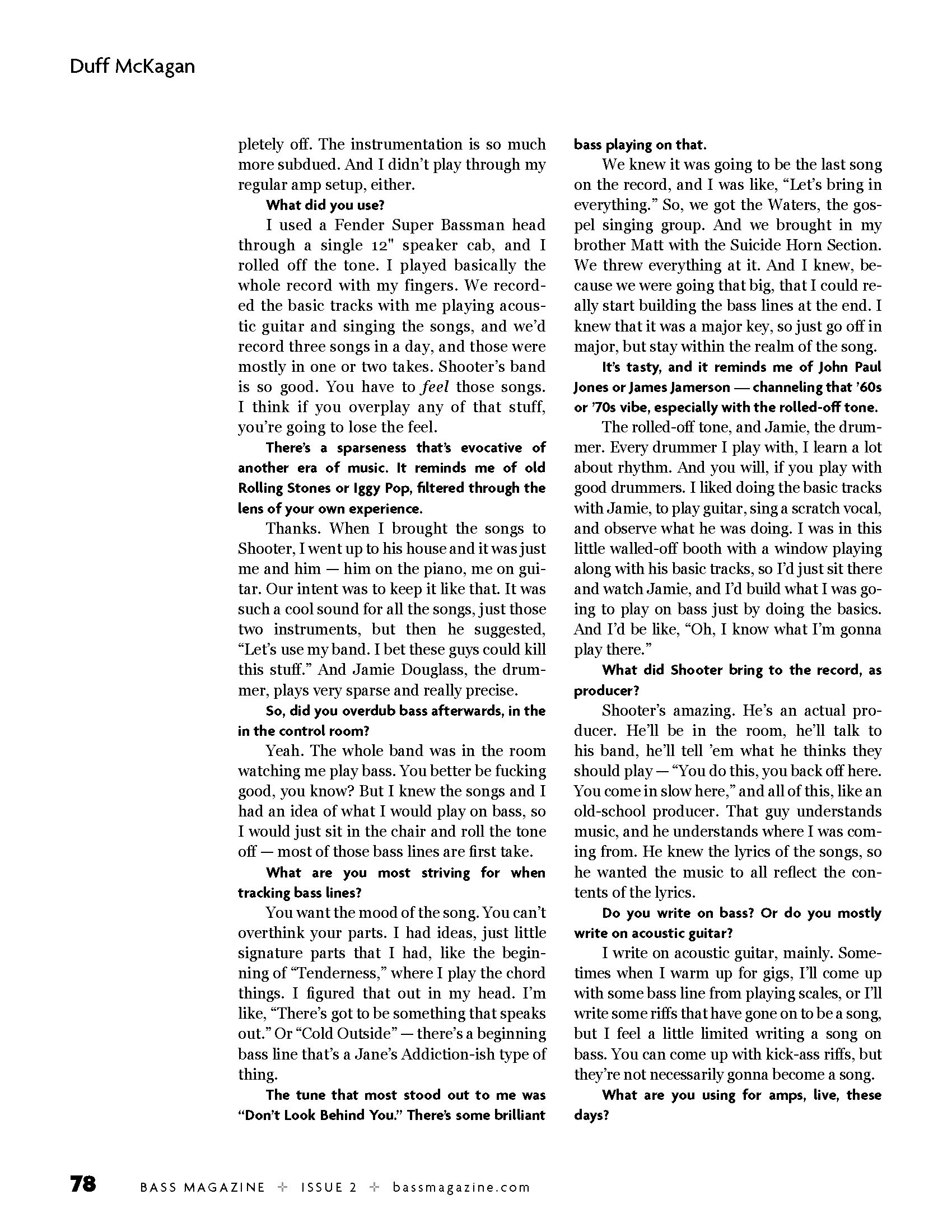
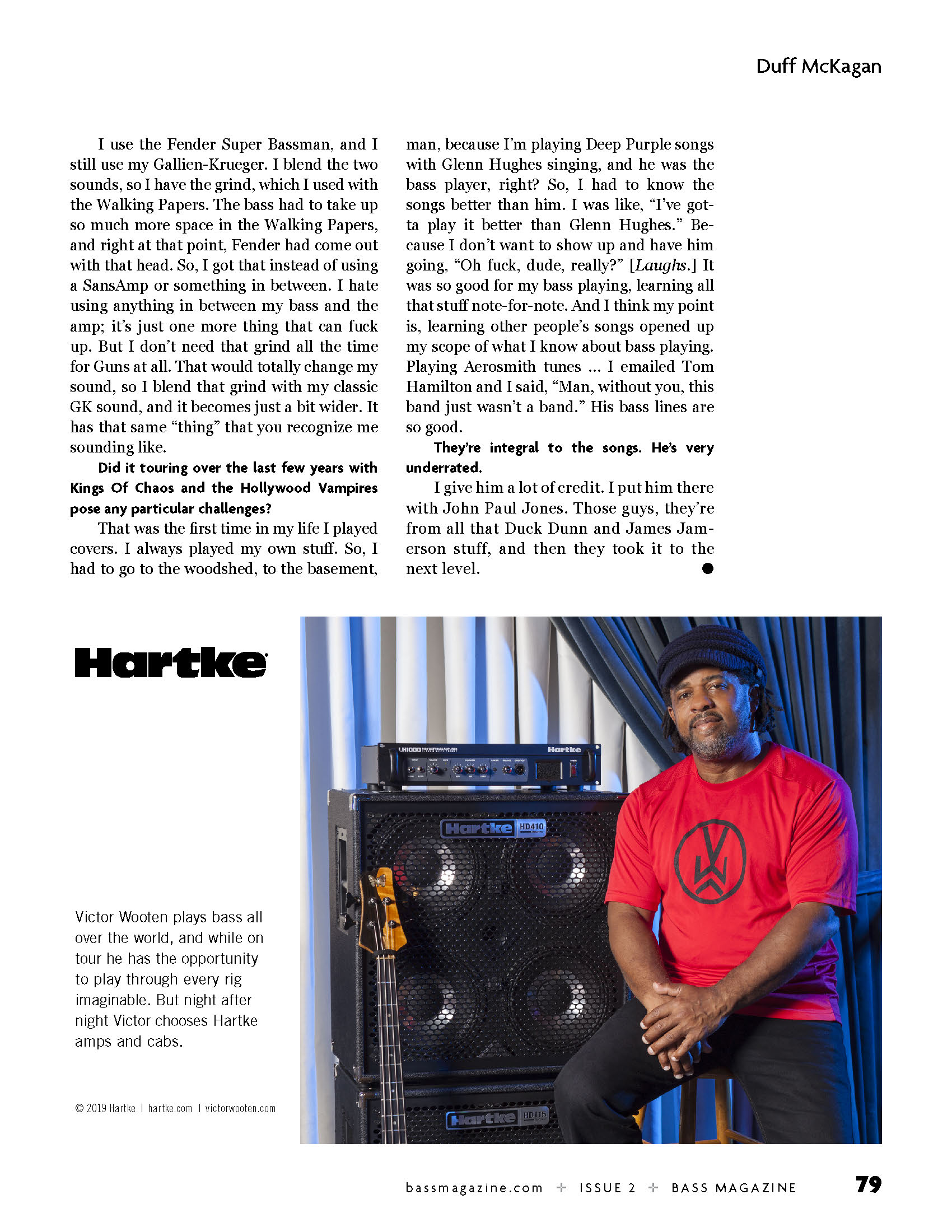
Transcript:
----------------
Guns N’ Roses, Velvet Revolver, Walking Papers, Duff McKagan’s Loaded
DUFF MCKAGAN
By Freddy Villano
The rock icon steps into the spotlight with a new solo album and a new line of signature basses
IN 2016, Duff McKagan played at the Grammys with the Alice Cooper-fronted supergroup the Hollywood Vampires. Motorhead’s Lemmy Kilmister had recently passed away, so Cooper wanted to perform “Ace of Spades” as a tribute to the venerable iron man of rock and metal. “Alice asked about playing it at the rehearsals a couple days before, ’cause I mean, Lemmy’s gone, right?” recalls McKagan. “As much as Iggy Pop or anything else, those Motorhead songs are part of my makeup, you know? So he’s singing it at the rehearsal and I’m joining in [on vocals], and he’s like, ‘Fuck, I just can’t get the cadence of this down.’ So we kept working it, and we got to the Grammy rehearsals, and he’s like, ‘Would you just sing the whole song with me?’ I’m like, ‘No problem, man.’ So that was kind of fun.”
Kind of fun? To say that Duff McKagan has lived a charmed life would be a massive understatement. He’s arguably one of the most commercially successful and stylistically identifiable bass players in the history of rock & roll. He grasped the brass ring as a 21-year-old with his then-fledgling L.A.- based band, Guns N’ Roses in the late ’80s and has seemingly never let go. GNR’s debut album, Appetite for Destruction [1987, Geffen] topped the Billboard 200 and became the best-selling debut album of all time. It is the 11th all-time best-selling album in the U.S. and has sold over 30 million copies worldwide. Appetite spawned numerous hit songs, among them “Welcome to the Jungle,” “Paradise City,” and “Sweet Child o’ Mine,” the latter featuring one of the most recognized bass motifs in the annals of popular music. McKagan’s Gallien-Krueger-driven, pick-wielding tone and nuanced rhythmic and melodic sensibility quickly became a signature of the GNR sound. They followed up Appetite with Use Your Illusion I and II [1991, Geffen], both of which were certified seven times platinum by the RIAA — but internal strife was driving the band apart. McKagan was the last original member to leave in August 1997 (aside from lead singer Axl Rose, who continued to helm the GNR moniker).
In 2002, McKagan formed Velvet Revolver with his former GNR bandmates Slash (guitar) and Matt Sorum (drums), along with ex-Stone Temple Pilots singer Scott Weiland. Again, he grasped the brass ring, earning a 2005 Grammy for Best Hard Rock Performance for the single “Slither” from Velvet Revolver’s debut album, Contraband [2004, RCA], which debuted at #1 on the Billboard 200 chart. Weiland left to rejoin STP in 2008, and Velvet Revolver, after failing to land a suitable replacement, became inactive. But that hardly slowed McKagan down.
In between such high-profile records, performances, and projects, the Seattle native launched several of his own projects, including Loaded, 10 Minute Warning (a reformation of his childhood band, featuring Pearl Jam guitarist Stone Gossard), and Walking Papers. He briefly joined Jane’s Addiction in 2010 and has more recently toured with such all-star acts as Kings Of Chaos and the aforementioned Hollywood Vampires. Though he began appearing with GNR again, off and on, since 2010 — the most high-profile performance being their induction into the Rock and Roll Hall of Fame in 2012 — he didn’t officially rejoin until 2016, alongside his longtime cohort, Slash (guitar) and Axl Rose (vocals). Oh, and he’s also written a couple of New York Times Bestsellers, including his autobiography, It’s So Easy (And Other Lies) and How to Be a Man: (and other illusions).
Since McKagan rejoined in 2016, GNR’s Not in This lifetime Tour has grossed over $500 million, making it the second-highest-grossing concert tour of all time. But that is little cause for McKagan to rest on such laurels. In fact, it seems to have instigated a period of prolific creativity. He’s currently promoting a new signature bass from Fender, as well as his soon-to-be-released solo album, Tenderness, which was produced by Shooter Jennings (son of Waylon Jennings).
Tenderness, recorded at Station House studios in Echo Park, California, is a pleasantly surprising musical nod toward classic soul and country, featuring McKagan on lead vocals, acoustic guitar, and of course, bass, and reflecting his personal experiences traveling the globe over two and a half years on the road with GNR. “We’re becoming divided at a time when we need each other most,” he says, referring to his observations of the current socio-political Zeitgeist. “Homelessness and drug addiction are avoidable in this country if we come together and get private and public cogs turning together in a positive direction,” he proclaims as an example of just one of the issues he’s attempting to tackle on Tenderness. “As a father, I must say and do something, while I’m able to.”
We checked in with McKagan while he was promoting both the album and the bass, from Fender’s offices in Corona, California. He was affable, humble, and forthcoming as the conversation touched on topics including his personal growth as a bassist, the GNR reunion, and naturally, his new solo album.
How involved were you with the development of your signature bass, from start to finish? Is it based on the white Fender Jazz Special with the black headstock?
I was involved in that first one that came out whenever that was, 2005 — that’s the one you are referring to. In 2009 I started taking a bunch of bass lessons, and one of the teachers I studied with was Reggie Hamilton, who plays on basically every R&B session there is out there [Seal, Babyface, Queen Latifah, to name a few.] He lives near my house in LA., and I’ve gotten to know him over the years — super nice guy. I approached him to give me lessons, and he was like, “Oh, man. I couldn’t show you anything.” I’m like, “Yes, you could!” He’s so humble. He taught me a bunch. But the thing is ... he sent me one of his basses, a Fender Reggie Hamilton Signature Jazz. I was on the road with Velvet Revolver and got it in England. I was like, “I got this surprise package from Reggie” — very sweet. And it had a drop-D tuning thing [Hip- shot Xtender] on it, and it was modified with my pickup configuration [P/J], so it sounded like my bass.
So, how did that morph into your signature bass?
Flash-forward a couple years and I started playing with these guys in Seattle: Jeff Angell, Barrett Martin, and Ben Anderson, in this band the Walking Papers, which kept my chops up, let me tell you. Barrett Martin is this kind of stunning, John Bonham-ish drummer. He played in the Screaming Trees. His drumming is based in Senegalese rhythms, and he’s gone to Senegal and studied with the masters. And so, the bass and drums were like this super post-punk, huge driving force in this band, and it had a lot of drop-D tunings, so I got that Reggie Hamilton bass out, and that’s the one I played every gig. It became my workhorse. Fender saw me playing this thing a bunch — this was before Guns even got back together — and they approached me about doing a second signature model based on that bass. I still wanted it to sound like my Jazz Special, but it really doesn’t [laughs]. It has a bit more output for whatever reason; maybe it’s because of the pickguard. But it’s not because of the pickups or that it’s active or anything.
So, did they take your bass and try to replicate it? Or did they just make modifications to the Reggie Hamilton bass based on your preferences?
They might have at some point [borrowed it to replicate]. They know what they’re doing. The thing is that Reggie Hamilton’s mod- ded bass has an active switch on it, which I have never used, so we took that out.
You don’t strike me as an active-pickup kind of guy.
I never even understood active basses. To me, they sound really abrasive and dinky. And some people swear by ’em, and I’m not discounting that. Maybe if you know how to use that, that’s wonderful; I’m not that guy.
It’s all about context, right?
I think it is, yeah. My context is James Jamerson and Paul Simonon and John Paul Jones. And none of those guys used active electronics. [Ed. Note: John Paul Jones used active electronics in his Alembic basses.]
Having gone from playing with GNR and then Velvet Revolver, to taking lessons with Reggie Hamilton and playing in Walking Papers, and then going back to GNR, did you reflect differently on your GNR bass lines with all of this new information at your disposal?
Wonderful question. Oh my God, yes it did. And, something I never did in the early days with Guns, I play with my fingers on my right hand on songs like “Estranged” and “November Rain.” So, yeah, approaching the Guns stuff now, I play maybe a third of the set with my fingers.
That’s certainly a change in character.
I think I get more feeling out of songs like “Estranged” and “November Rain.” I play a couple of the Chinese Democracy songs with my fingers too. It expanded my approach, and the sounds at my disposal, by going back and forth [between fingers and pick]. On some of the slower songs, I have more control playing with my fingers, and that’s something I wanted to learn how to do when I took lessons with Reggie Hamilton, and then John Humphries [Musicians Institute] and Scott Shriner [Weezer].
Since playing with a pick has kind of been your forte, where does your style/technique come from?
That comes from playing guitar and bass in punk-rock bands — downstrokes. Now I two-way stroke. I’ll always attribute down- strokes to Johnny and Dee Dee Ramone.
They are the architects of that style.
But I grew out of that — not that that’s anything you should strive to grow out of; that’s a great place to be, playing down- strokes like those guys. Slash and I still hold pride in being able to downstroke super-fast. But I have learned over the years to down- and-upstroke in a consistent way, and the thing about being a bass player is the consistency of your sound.
What do you think about the age-old adage, “less is more”?
I think, more and more, I’ve learned where not to play. As you grow as a bass player, the good ones that I listen to, it’s all about the space they leave. And I kind of knew that from the beginning. In Guns, I knew I didn’t always have to play over the drums [fills], but if I did do a line with the drums, it better be perfect and something fucking cool.
I always say, “if you do a fill, make sure it’s a statement. Don’t just do it because it’s the end of four bars.”
I think that’s the difference between a bar band and a real band.
The rhythm section makes a big difference.
It’s how they play with each other and the space they leave for everything else. There are times to get aggressive and the rhythm section has to take over. But you have to know when those times are, and that only comes from playing a lot and just figuring it out. Whatever band you’re in, however that band is made up, figure out your power plays and stick to them — let the vocal be the vocal when it’s time for the vocal. And let the guitar be the guitar when it’s time for the guitar. As a bassist, you’ve got to be consistent.
Has playing with different drummers affected your approach to the GNR catalog?
Yes. Frank [Ferrer, current GNR drummer] is a big, solid drummer. He’s got some real nice pocket, but every drummer is so different. Some of them don’t play with a click ever, and some play with a click always, and some just use a click for tempo at the beginning or somewhere in the middle of the song. Frank uses a click in really cool places. Like, we’ll have to slow down for a bridge, and sometimes you’ll feel the song really pull back, because you get excited when you’re playing, and sometimes you speed shit up. And he’ll be like a marshal — he’ll marshal that and really pull us back.
How long did it take you guys to gel in rehearsal?
It wasn’t instantaneous. We rehearsed six days a week for three months. And I’m talking six- and eight-hour rehearsals. First, we had to learn how to play all of those songs together, because Richard Fortus [guitar] was there, too. And we brought in Melissa Reese, who is awesome — not only what she does with her keys, but she’s an opera singer and a jazz singer, so her backup vocals are incredible, and she’s got perfect pitch. So, you’ve got me and Slash, you’ve got Richard, you have Frank, Dizzy [Reed, keyboards], who we’re used to playing with, and then Melissa.
So how did you make all that gel?
We worked really hard, and a lot of that was Frank and I working on how we played together, and how we ended up playing the songs a certain way. We had to change some of it, because he played off the tapes of the previous drummer and was inventing new ways to play the songs. We were like, “Frank, let’s just go to the original way these songs were played.” He’s such a fuckin’ nice guy, and super down with whatever you want to try. And he’s just got a big ol’ pocket, and he hits his drums in the right places, which is something that drummers should learn how to do. You don’t have to bang the shit out of drums to have pocket. Dave Grohl [Nirvana, Foo Fighters] looks like he’s banging the shit out of drums, but he’s just playing those drum heads in the right places. I was a drummer, so I’m really aware of what a drummer’s thinking...or I try to be, I should say.
When you were rehearsing, and listening back to the earlier GNR recordings, were you like, “Hey man, that kid wrote some pretty cool bass lines”?
Even before we went into rehearsal, I was in my basement for a month, five days a week, and I would spend so much time down there, because I didn’t want to show up at rehearsals not knowing my shit. Slash was doing the same thing. We were texting each other like, “Fuck [laughs]!” I don’t sit around my house listening to Guns N’ Roses records — like, ever. When we made Appetite, I didn’t sit at my house and listen to the record. We were out playing. We played those songs a million times before we made that record, but I never revisited the stuff, ever, until we were like, “Okay, we’re gonna do this [reunion].”
Do you recall your immediate reaction to the material upon hearing it for the first time in a while?
It’s pretty good shit [laughs]. I remember how hard we worked as a band [back then]. I mean, that band, back in the Appetite days, when we were playing clubs, we would rehearse twice a day. And sometimes it would be just a bass and drums rehearsal, and then the band would come in and we’d rehearse with the whole band. We rehearsed every fucking day, and we made sure all the parts were what they were. And the same with Use Your Illusion I and II. Man, we rehearsed the fuck out of it, and we were really, really thoughtful about all of that stuff, and so, yeah, in December 2015, I was just down in the basement, rediscovering all that stuff, and there were moments where I’m like, “Oh shit, we played the exact right things there.” I couldn’t think of anything better to play. I was on it as this 21-year-old kid [laughs].
I’ve been listening to your new record, Tenderness. It is such a different tone and approach from you as a bass player, I almost didn’t think it was you.
Yeah, that’s me [laughs]. I rolled off the tone for this record. I rolled the tone completely off. The instrumentation is so much more subdued. And I didn’t play through my regular amp setup, either.
What did you use?
I used a Fender Super Bassman head through a single 12" speaker cab, and I rolled off the tone. I played basically the whole record with my fingers. We recorded the basic tracks with me playing acoustic guitar and singing the songs, and we’d record three songs in a day, and those were mostly in one or two takes. Shooter’s band is so good. You have to feel those songs. I think if you overplay any of that stuff, you’re going to lose the feel.
There’s a sparseness that’s evocative of another era of music. It reminds me of old Rolling Stones or Iggy Pop, filtered through the lens of your own experience.
Thanks. When I brought the songs to Shooter, I went up to his house and it was just me and him — him on the piano, me on guitar. Our intent was to keep it like that. It was such a cool sound for all the songs, just those two instruments, but then he suggested, “Let’s use my band. I bet these guys could kill this stuff.” And Jamie Douglass, the drummer, plays very sparse and really precise.
So, did you overdub bass afterwards, in the in the control room?
Yeah. The whole band was in the room watching me play bass. You better be fucking good, you know? But I knew the songs and I had an idea of what I would play on bass, so I would just sit in the chair and roll the tone off — most of those bass lines are first take.
What are you most striving for when tracking bass lines?
You want the mood of the song. You can’t overthink your parts. I had ideas, just little signature parts that I had, like the beginning of “Tenderness,” where I play the chord things. I figured that out in my head. I’m like, “There’s got to be something that speaks out.” Or “Cold Outside” — there’s a beginning bass line that’s a Jane’s Addiction-ish type of thing.
The tune that most stood out to me was “Don’t Look Behind You.” There’s some brilliant bass playing on that.
We knew it was going to be the last song on the record, and I was like, “Let’s bring in everything.” So, we got the Waters, the gospel singing group. And we brought in my brother Matt with the Suicide Horn Section. We threw everything at it. And I knew, because we were going that big, that I could really start building the bass lines at the end. I knew that it was a major key, so just go off in major, but stay within the realm of the song.
It’s tasty, and it reminds me of John Paul Jones or James Jamerson — channeling that ’60s or ’70s vibe, especially with the rolled-off tone.
The rolled-off tone, and Jamie, the drummer. Every drummer I play with, I learn a lot about rhythm. And you will, if you play with good drummers. I liked doing the basic tracks with Jamie, to play guitar, sing a scratch vocal, and observe what he was doing. I was in this little walled-off booth with a window playing along with his basic tracks, so I’d just sit there and watch Jamie, and I’d build what I was going to play on bass just by doing the basics. And I’d be like, “Oh, I know what I’m gonna play there.”
What did Shooter bring to the record, as producer?
Shooter’s amazing. He’s an actual producer. He’ll be in the room, he’ll talk to his band, he’ll tell ’em what he thinks they should play — “You do this, you back off here. You come in slow here,” and all of this, like an old-school producer. That guy understands music, and he understands where I was coming from. He knew the lyrics of the songs, so he wanted the music to all reflect the contents of the lyrics.
Do you write on bass? Or do you mostly write on acoustic guitar?
I write on acoustic guitar, mainly. Sometimes when I warm up for gigs, I’ll come up with some bass line from playing scales, or I’ll write some riffs that have gone on to be a song, but I feel a little limited writing a song on bass. You can come up with kick-ass riffs, but they’re not necessarily gonna become a song.
What are you using for amps, live, these days?
I use the Fender Super Bassman, and I still use my Gallien-Krueger. I blend the two sounds, so I have the grind, which I used with the Walking Papers. The bass had to take up so much more space in the Walking Papers, and right at that point, Fender had come out with that head. So, I got that instead of using a SansAmp or something in between. I hate using anything in between my bass and the amp; it’s just one more thing that can fuck up. But I don’t need that grind all the time for Guns at all. That would totally change my sound, so I blend that grind with my classic GK sound, and it becomes just a bit wider. It has that same “thing” that you recognize me sounding like.
Did it touring over the last few years with Kings Of Chaos and the Hollywood Vampires pose any particular challenges?
That was the first time in my life I played covers. I always played my own stuff. So, I had to go to the woodshed, to the basement, man, because I’m playing Deep Purple songs with Glenn Hughes singing, and he was the bass player, right? So, I had to know the songs better than him. I was like, “I’ve gotta play it better than Glenn Hughes.” Because I don’t want to show up and have him going, “Oh fuck, dude, really?” [Laughs.] It was so good for my bass playing, learning all that stuff note-for-note. And I think my point is, learning other people’s songs opened up my scope of what I know about bass playing. Playing Aerosmith tunes ... I emailed Tom Hamilton and I said, “Man, without you, this band just wasn’t a band.” His bass lines are so good.
They’re integral to the songs. He’s very underrated.
I give him a lot of credit. I put him there with John Paul Jones. Those guys, they’re from all that Duck Dunn and James Jamerson stuff, and then they took it to the next level.
GEAR
Basses Fender Duff McKagan Deluxe Precision Bass, Fender Jazz Bass Special (made in Japan), Fender Aerodyne Jazz Bass Amps Gallien-Krueger MB800, Fender Super Bassman
Strings Rotosound RS66LD Longscale Swing 66 (.045, .065, .080, .105)
Picks Dunlop 418P Tortex Standard .73mm (yellow)
Effects Ibanez CS9 Stereo Chorus
Accessories Shure UHF-R Wireless, Radial JX44 Air Control Guitar Signal Manager, Radial JR-5 Remote Footswitch, T-Rex Fuel Tank Power Supply
HEAR HIM ON
Tenderness, Duff McKagan (2019)

Blackstar- ADMIN
- Posts : 13467
Plectra : 87860
Reputation : 100
Join date : 2018-03-17
 Similar topics
Similar topics» 2015.11.08 - Bass Frontiers Magazine - Interview with Duff
» 1997.01.DD - Bass Player Magazine - Interview with Duff
» 2004.03.DD - Bass Player Magazine - Welcome Back To The Jungle (Duff)
» 2004.10.DD - Guitar & Bass Magazine - Magnum Force (Duff)
» 2021.09.15 - Dunlop Presents Bass Freq's Podcast - Interview with Duff
» 1997.01.DD - Bass Player Magazine - Interview with Duff
» 2004.03.DD - Bass Player Magazine - Welcome Back To The Jungle (Duff)
» 2004.10.DD - Guitar & Bass Magazine - Magnum Force (Duff)
» 2021.09.15 - Dunlop Presents Bass Freq's Podcast - Interview with Duff
Page 1 of 1
Permissions in this forum:
You cannot reply to topics in this forum
